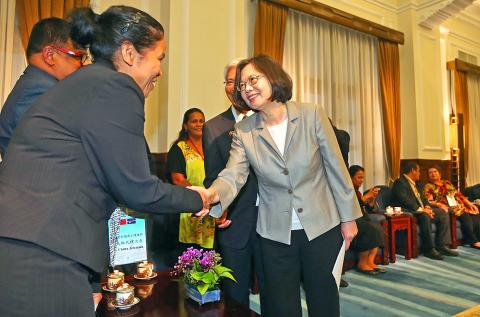President Tsai Ing-wen (蔡英文) yesterday met with Palauan President Tommy Remengesau Jr in her first open meeting after assuming the presidency on Friday, departing from the customary appellation used by former president Ma Ying-jeou (馬英九) by referring to her administration as the “Taiwanese government.”
Under Ma, public meetings with foreign dignitaries used the formal title of “Republic of China (ROC) government” when referring to Taiwan. While the word “Taiwan” was used sparingly, it was very rarely used in the context of the “Taiwanese government.”
Tsai welcomed Remengesau, who was in Taiwan for Tsai’s inauguration, and said that the two nations could cooperate on the issue of marine conservation.

Photo: CNA
When speaking on bilateral cooperation, Tsai used the term “we” and mentioned “the ROC.”
She said Taiwan can learn from important environmental achievements during Remengesau’s tenure, such as the Micronesian Center for a Sustainable Future and the Palau National Marine Sanctuary.
Meanwhile, Beijing yesterday warned Taiwan that it would cut off critical contacts if Tsai does not state her support for the “one China” framework.
The comments came a day after Tsai’s inauguration speech, in which she called for “positive dialogue” with China, but stopped short of any compromise on Beijing’s demands that she support its “one China” principle.
Beijing and Taipei have had regular, official communication since 2014, but that would stop unless Tsai acknowledges the so-called “1992 consensus,” Xinhua news agency quoted China’s Taiwan Affairs Office spokesman Ma Xiaoguang (馬曉光) as saying.
“The communication mechanism between the two departments can only continue if the 1992 consensus, which represents the common political foundation of the one China principle, is adhered to,” he was quoted as saying.
In her speech, Tsai reiterated her stance of recognizing that a meeting took place between the Chinese Nationalist Party (KMT) and Chinese officials in 1992, but did not endorse it.
The “1992 consensus,” a term former Mainland Affairs Council chairman Su Chi (蘇起) admitted making up in 2000, refers to a tacit understanding between the KMT and the Chinese government that both sides of the Strait acknowledge there is “one China,” with each side having its own interpretation of what “China” means.

MAKING WAVES: China’s maritime militia could become a nontraditional threat in war, clogging up shipping lanes to prevent US or Japanese intervention, a report said About 1,900 Chinese ships flying flags of convenience and fishing vessels that participated in China’s military exercises around Taiwan last month and in January have been listed for monitoring, Coast Guard Administration (CGA) Deputy Director-General Hsieh Ching-chin (謝慶欽) said yesterday. Following amendments to the Commercial Port Act (商港法) and the Law of Ships (船舶法) last month, the CGA can designate possible berthing areas or deny ports of call for vessels suspected of loitering around areas where undersea cables can be accessed, Oceans Affairs Council Minister Kuan Bi-ling (管碧玲) said. The list of suspected ships, originally 300, had risen to about 1,900 as

Japan’s strategic alliance with the US would collapse if Tokyo were to turn away from a conflict in Taiwan, Japanese Prime Minister Sanae Takaichi said yesterday, but distanced herself from previous comments that suggested a possible military response in such an event. Takaichi expressed her latest views on a nationally broadcast TV program late on Monday, where an opposition party leader criticized her for igniting tensions with China with the earlier remarks. Ties between Japan and China have sunk to the worst level in years after Takaichi said in November that a hypothetical Chinese attack on Taiwan could bring about a Japanese

MORE RESPONSIBILITY: Draftees would be expected to fight alongside professional soldiers, likely requiring the transformation of some training brigades into combat units The armed forces are to start incorporating new conscripts into combined arms brigades this year to enhance combat readiness, the Executive Yuan’s latest policy report said. The new policy would affect Taiwanese men entering the military for their compulsory service, which was extended to one year under reforms by then-president Tsai Ing-wen (蔡英文) in 2022. The conscripts would be trained to operate machine guns, uncrewed aerial vehicles, anti-tank guided missile launchers and Stinger air defense systems, the report said, adding that the basic training would be lengthened to eight weeks. After basic training, conscripts would be sorted into infantry battalions that would take

DEEP-STRIKE CAPABILITY: The scenario simulated a PLA drill that turned into an assault on Taiwan’s critical infrastructure, with the launchers providing fire support Taiwan yesterday conducted this year’s first military exercises at Longsiang Base in Taichung, demonstrating the newly acquired High Mobility Artillery Rocket System’s (HIMARS) ability to provide fire support and deep-strike capabilities. The scenario simulated an attack on Penghu County, with HIMARS trucks immediately rolling into designated launch areas and firing barrages at the Wangan (望安) and Cimei (七美) islands, simulating the provision of fire support against invading forces. The HIMARS are supposed to “fire and leave,” which would significantly increase personnel and equipment survivability, a military official said. The drill simulated an exercise launched by the Chinese People’s Liberation Army (PLA) Eastern